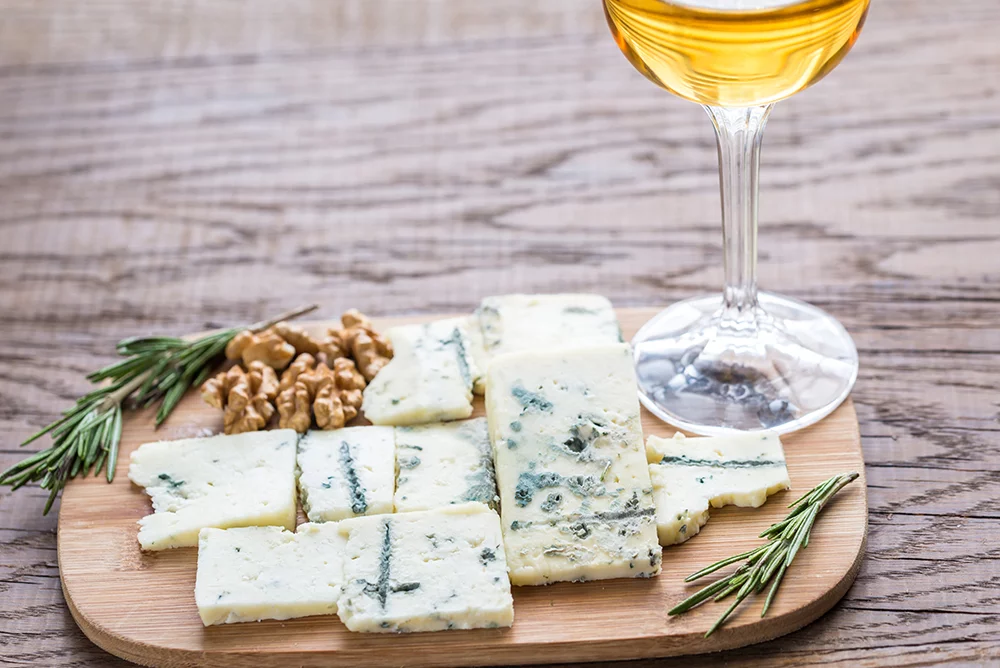Blue cheese is an exceptional product, renowned for its powerful flavor and creamy texture. Pairing it with wine requires careful consideration, as its intensity can easily overpower an overly delicate wine. Traditionally, natural sweet wines are preferred to counterbalance the saltiness and bitterness of blue cheese. However, other less obvious combinations can also reveal new gustatory dimensions.
The perfect pairing: natural sweet wines and blue cheese
Natural sweet wines are the ideal companions for blue cheeses. Their sugar content softens the strength of the cheese, while their acidity balances the richness of the blue-veined paste.
- Sauternes and Roquefort: this emblematic marriage works thanks to the opposition between the sweetness of the wine and the saltiness of the cheese. Sauternes, with its notes of honey and apricot, coats the power of Roquefort, creating a perfect balance.
- Port and Stilton: a Vintage Port or Tawny develops aromas of red fruits and spices that match the intensity of Stilton. Stilton, which is creamier than Roquefort, finds a rich, velvety partner in Port.
- Banyuls and Fourme d'Ambert a Roussillon wine, like the Banyuls or the Maurybrings a fruity, chocolatey dimension that goes particularly well with less aggressive blue cheeses such as Fourme d'Ambert or the Bleu d'Auvergne.

Thinking outside the box: daring agreements
While natural sweet wines dominate classic pairings, there are other, more surprising options worth exploring.
Red wines: a risky but possible bet
Red wine is rarely paired with blue cheese, as its tannins can accentuate the cheese's bitterness. However, certain well-chosen reds can offer an interesting pairing:
- A Pinot Noir from Burgundy: light and fruity, with good acidity, it goes well with a milder blue cheese, such as Fourme d'Ambert or Bleu de Gex.
- A Rhône Grenache: rich and spicy, it brings a pleasant roundness to a mature Gorgonzola.
For a successful pairing of red wine and blue cheese, it's best to choose wines that are low in tannin and fruity.
Dry, aromatic white wines
Dry white wines bring a freshness and minerality that contrast with the richness of blue cheese.
- Riesling Grand Cru and Gorgonzola: the acidity of the Riesling balances the fatness of the Gorgonzola, while its citrus aromas add complexity.
- Gewurztraminer and Bleu des Causses: this Alsace wine, with notes of rose and sweet spices, creates an original contrast with the strength of Bleu des Causses.
These white wines reveal another facet of blue cheese, more elegant and less marked by sugar.
Champagne: an unexpected choice
Sparkling wines are often underestimated when it comes to accompanying blue cheese. Yet their acidity and bubbles help balance the cheese's creamy texture and strong flavor.
- A Champagne Brut and a Bleu d'Auvergne: the liveliness of the Champagne cleanses the palate and harmonizes beautifully with the sweetness of the Bleu d'Auvergne.
- Crémant de Loire and Fourme d'Ambert: this sparkling wine, slightly fruitier than Champagne, enhances the flavors of the cheese without overpowering them.
Tips for pairing wine and blue cheese
To choose the right wine with blue cheese, there are several criteria to consider:
- The intensity of the cheese: the stronger the blue, the more structured the wine. Roquefort requires a very sweet wine like Sauternes, while Bleu de Gex can be matched with a dry white wine.
- Creaminess: a creamy blue cheese (Gorgonzola, Stilton) pairs well with velvety-textured wines like Port or Gewurztraminer.
- Type of ageing: young blue cheeses are milder and go well with light wines, while aged blue cheeses require more concentrated wines.
Depending on the blue cheese chosen, the wine can reinforce its character or, on the contrary, add sweetness and freshness.
If you enjoyed this article, you may also be interested in "Why do some wines have a darker color than others?





